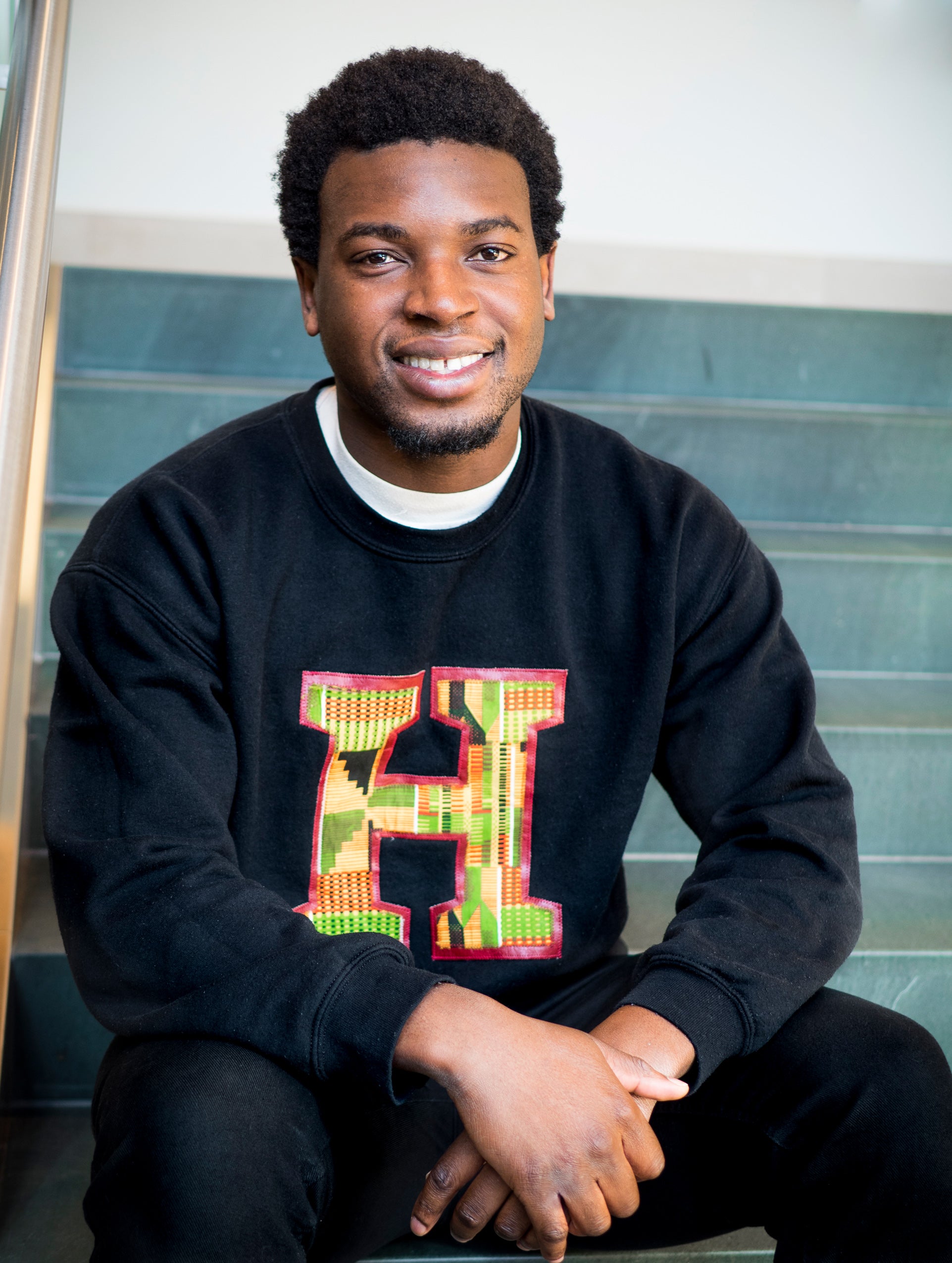Few people at Harvard or elsewhere manage to pack more activity into a workday than Memme Onwudiwe ’19.
One day last month, he was finalizing deals for Evisort, the Harvard Law-MIT startup that he joined soon after its founding, which was then on the final day of a quarter. He was also a few hours away from an interview with the President of Ghana, the latest in a series of notable interviews he’s arranged for the Kennedy School’s Africa Policy Journal. Meanwhile, being a 3L a few months from graduation brings pressures of its own.
It all ties in with his belief that anyone who doesn’t pursue a wide range of interests at Harvard Law School is missing a golden opportunity.
“I’ll tell you something about Harvard,” he said. “It’s an amazing place, a magical place, and I think too many people keep their heads down and don’t realize the kind of opportunity they have just by going here. They feel artificial barriers and don’t realize they have the whole campus at their disposal, the top law school, the top business school …” In fact, he expresses surprise that more students haven’t worked across disciplines. “People will try to put you in a box, but if you’re here you don’t have to prove anything. If we at Harvard aren’t doing what makes us fulfilled and pursuing these opportunities, who is?”
Born in Xenia, Ohio to Nigerian and Ghanaian parents, he was able to visit Africa as a teenager, and absorbed many different kinds of views. He cross-listed classes at Harvard College to learn Igbo, his father’s native language. As an Ohio Wesleyan undergraduate he worked on the OWU Technology Committee, which led to him being chosen as his class’s representative on the HLS IT Steering Committee, and ultimately to organize and co-chair HLS’s first ever Legal Technology Symposium with Riley Hawkins ’19. And though he doesn’t plan to pursue law after graduation, he worked for Ropes & Gray last summer on the prestigious Roscoe Trimmier Jr. Diversity Scholarship. He’s served as the class of 2019 representative on former Dean Martha Minow’s HLS Task Force on Academic Community and Student Engagement. As a 1L, he was also runner-up in the American Bar Association’s Haiku Contest for Law Students.
One of his turning points at HLS came when former Ghanaian President John Mahama visited campus in 2017 to speak at the Harvard African Development Conference. “I was a 1L and I’d only been on campus for six months. When I heard he was coming I asked if I could do an interview and was told, ‘Sure, if you can get to him.’ And I did.” The result was an interview that was published in the 2018 Africa Policy Journal. Onwudiwe and other students on the board of the journal have since had the opportunity to interview other African officials while they were visiting Harvard for major events, including former Nigerian President Olusegun Obasanjo; Okey Oramah, president of the African Export-Import Bank; Nabeela Tunis, Sierra Leone’s minister of planning and economic development; and many others. As a 2L, Onwudiwe served as co-editor-in-chief of the journal. And this March, as a 3L, things came full circle, when he interviewed Ghana’s current President Nana Akufo-Addo alongside Ameze Belo-Osagie, who is currently a 1L. “Her parents are Nigerian and Ghanaian like mine, and it feels like I’m passing the baton.”
Another pivotal event came last year when he was a temporary attachment at the Nigerian Office of Trade Negotiations with Charles Nwaogu ’19. At the time he was president of the Harvard African Law Association (HALA) and used the opportunity to sign a memorandum of understanding with the office that would facilitate HALA students continuing to work in Nigeria. “We helped to draft Nigeria’s first ever Nigerian trade policy review, that is historic!” he says. “I’m glad we’ve made it easier for HLS students to do more work on the continent. This year three students worked in Nigeria during Winter Term, and I hope those numbers continue to grow.”
Much of his energy currently goes into his work as executive vice president of Evisort, which he joined as a 1L at the invitation of its cofounders Jacob Sussman ’18 and Jerry Ting ’18. Described by Ting as “like Google for legal contracts,” Evisort has revolutionized the way lawyers manage contracts, using artificial intelligence to sort through and organize material that would normally take many hours and multiple personnel.
“I honestly think it’s a paradigm shift,” Onwudiwe says. “Using AI, all the data from contracts can be extracted. Let’s say that you are negotiating with a company that you may have worked with for ten years. You can find all the most favorable language they have agreed to with you in the last decade with ease, be it around the governing law, warranties, or notices. That can really improve your negotiating position. We’re transitioning from just legal-tech to business intelligence, and I think we are going to continue to grow.” In February, Evisort announced that it had raised $4.5 million in seed funding, backed by tech entrepreneurs including Mark Zuckerberg, Bill Gates, and Jeff Bezos through the venture capital firm Village Global and the San Francisco-based Amity Ventures. Evisort now has offices in Silicon Valley and downtown Boston.
Onwudiwe does have one regret about his time at HLS. He’s currently on the board of the Space Exploration and Admiralty Law Society (SEALS), and he wishes he’d taken the time to start a journal focusing on space law. “Harvard should have a Journal on Space Law, I feel passionately about that. Frankly, 99.9 percent of everything is outside of the earth — and that’s being generous to the earth. We could find an asteroid with more platinum than there is on earth — what is that going to mean? Building rules around that now is important, because it’s going to be the Wild West. HLS needs to be at the forefront of these issues.”
